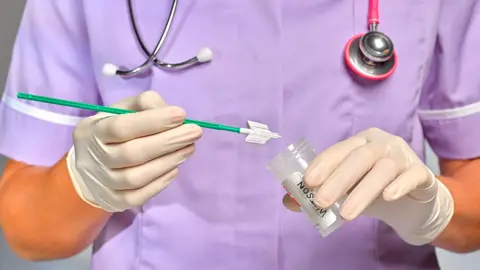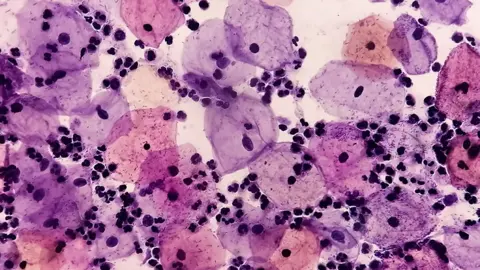Beauty salon staff trained to give cancer advice
 Getty
GettyHair and beauty salon staff are being trained to encourage people to go for cervical cancer screening and educate them about symptoms of the disease.
Humber and North Yorkshire Cancer Alliance is offering the free courses in areas with a low take-up of testing.
The training is designed to equip the salon staff with the skills to have conversations about cervical cancer with their customers.
NHS England figures show that about 30% of those eligible for screening do not attend.
The Cancer Alliance said the disease killed two people every day in England, yet 99.8% of cases were preventable.
The training outlines the symptoms and explains how the smear test works.
Salons in the lowest take-up areas, Goole, Grimsby, Hull, Scarborough and Scunthorpe, were also given posters and stickers to help customers learn more about the disease.
Juliet McNab, owner of York House Beauty Clinic in Scarborough, said she was happy to get involved with the scheme as she and several members of her staff had survived different types of cancer.
"My team and I have a very strong bond, having all dealt with cancer, and we consider ourselves lucky to still be here," she said.
"We believe very strongly in the power of conversations about cancer already, so when the Cancer Alliance got in touch about their training, we jumped at the chance."
 Getty
GettyAccording to the Cancer Alliance, the screening takes just 10 minutes.
It checks for a virus called high-risk human papillomavirus (HPV), which causes nearly all cervical cancers.
This means any cervical cell abnormalities can be treated. If left untreated, these cells can develop into cancer.
Dr Tami Byass, a GP at Eastgate Medical Group in Hornsea, said it was important to attend screenings and see a doctor straight away if patients had "concerning symptoms".
"Some of the main symptoms to be aware of are vaginal bleeding that is unusual for you," Dr Byass said.
"Including bleeding during or after sex, between your periods or after the menopause, or heavier periods than usual; pain during sex; and changes to your vaginal discharge."
Listen to highlights from Hull and East Yorkshire on BBC Sounds, watch the latest episode of Look North or tell us about a story you think we should be covering here.
